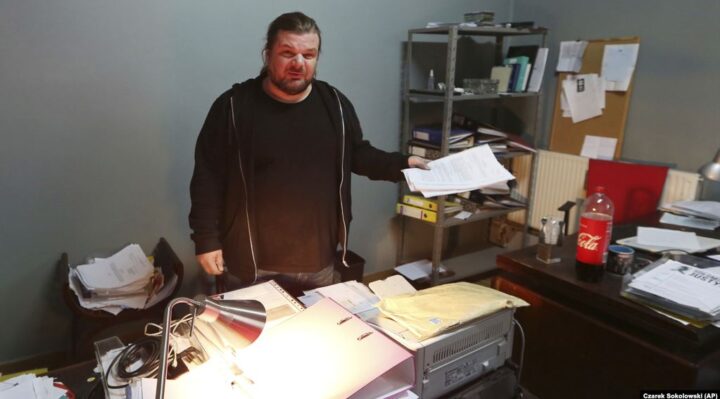Article 2 of the European Union’s main treaty proclaims that the EU “is founded on the values of respect for human dignity, freedom, democracy, equality, the rule of law, and respect for human rights.”
“These values are common to the member states,” the document states.
But earlier this month, Norway — which is not an EU member but guarantees human rights in its constitution — granted temporary political asylum to Polish human rights activist Rafal Gawel, his wife, and their small daughter. Oslo agreed with his contention that Poland’s populist government had significantly eroded the independence of the country’s judiciary.
“I simply showed that at the moment in Poland most of the courts have been taken over by politically empowered persons,” Gawel told to media in a telephone interview from Oslo. “Therefore, we cannot say that there is an independent judiciary in Poland, independent of executive-branch and government influence.”

Gawel, 47, is the founder and head of the Center for Monitoring Racist and Xenophobic Behavior in the eastern Polish city of Bialystok. In January 2019, he was sentenced to two years in prison after being convicted of fraud, forging signatures, and faking financial documents. He denies the allegations and says his conviction was political persecution for his center’s activity exposing far-right extremism.
Gawel, who also cited threats from far-right groups that he says have contacts with Poland’s ruling Law and Justice (PiS) party in his asylum application, is the first Pole to be granted political asylum in the West since Poland joined the EU in 2004 — and in fact, since the end of communist rule and the Cold War 15 years earlier.
The nationalist-populist PiS took over the Polish government in 2015 and has been accused of dismantling the country’s democratic institutions and of promoting right-wing extremism.
“Slowly, slowly, Poland is moving toward [being] a fundamentalist, Catholic country,” Gawel asserted. “The worst thing is that Polish populists…have noticed that it is a huge advantage to frighten people and consolidate their voters around fear…. Every few years PiS changes the narrative a little and pushes its followers to fear homosexuals or refugees or Muslims.”
Alarm bells over the PiS’s judicial reforms have been sounding since at least 2015. According to a European Commission report last month on the state of the rule of law in the bloc, the reforms “have increased the influence of the executive and legislative powers over the justice system and therefore weakened judicial independence.”
‘Fundamentally Deviating Interpretation’
Similar concerns have been voiced for years over Hungary under Prime Minister Viktor Orban and his nationalist Fidesz party. Hungary was downgraded to “partly free” on the Freedom In The World index issued by the U.S.-based NGO Freedom House. It accused the Fidesz government of instituting “policies that hamper the operations of opposition groups, journalists, universities, and nongovernmental organizations…whose perspectives it finds unfavorable.”
In 2019, the respected Central European University, partially funded by Hungarian-born billionaire George Soros, withdrew most of its activities from Hungary following a two-year campaign against it by the Fidesz government. The EU, the U.S. government, and academic institutions around the world denounced Budapest’s actions as an assault on academic freedom.
Roland Freudenstein, policy director of the Brussels-based Martens Centre, which is associated with the center-right European People’s Party, said Poland and Hungary presented a unique problem within the European Union because they are endorsing a “fundamentally deviating interpretation” of EU treaties.
“What we have in [these] two countries, we now have a fundamentally deviating interpretation of the treaties,” he told RFE/RL. “And it is extremely hard to mend this and to come back to a unified interpretation of the treaties with the political parties that are in power in those two countries.”
Poland and Hungary, Freudenstein said, “claim that rule of law is based on national traditions and that there is no genuinely valid European definition of the rule of law.”
“That’s the root of the problems we have in the European Union at the moment,” he added.
Sophie Pornschlegel, a political scientist with the European Policy Center, another Brussels-based think tank, noted that although the Gawel case involved non-EU member Norway, there have been examples of EU members Germany and the Netherlands declining to extradite Polish nationals using similar arguments.
“They don’t trust the justice system there, which is a huge issue because it is the basis of European cooperation to have mutual trust in the justice system, not only for citizens, but, of course, also for the single market,” Pornschlegel told RFE/RL.
She added that the fact that the union works on the basis of unanimity makes it difficult to confront members on questions of fundamental values.
“One of the big issues I see is that European values are seen as a political or policy field like any other policy field, without realizing that these are the fundamental values we base our cooperation on,” she said. “There should be a difference there in how you treat those issues compared to economic policy, climate change policy…. When those values are not respected anymore, then we have a real issue which goes beyond the kind of daily political interests and differences we may have.”
Real Change ‘Must Come Locally’
Stefan Lehne, a visiting scholar with Carnegie Europe, is more sanguine about the situation, although he acknowledges that the EU has “a big problem in quite a number of countries, specifically in Hungary and Poland.”
However, he said, the recent European Commission report on the rule of law found “there are problems in just about every member state.”
“There is nothing like a place where the rule of law is freely flourishing,” he told RFE/RL.
Lehne argues that the European Court of Justice may be the bloc’s best mechanism for rebuilding its values consensus, and said that the court had “become a little bit more active” in taking on rule-of-law matters.
“Both in the case of Hungary and Poland, there have been a number of judgements recently which ultimately have been implemented by the governments and led to changes,” he said.
Ultimately, however, he pins his hopes on Hungarian and Polish citizens, noting that Fidesz has suffered losses in recent municipal elections. “Similarly, in Poland, change is possible and the civil society in both places is alive,” he told RFE/RL. “It’s an uphill struggle and it will take some time, but fundamental change only comes locally.”
Gawel, who has vowed to continue his monitoring of the far right in Poland from Oslo, expressed similar hopes for Poland. “Poles are in general outspoken supporters of the European Union,” he said. “We, as a nation, have always valued the achievements of the West and Western civilization. We have always aspired to belong to it.”
“Everything will depend on whether democratic forces will be able to gain a voice in Poland or whether the PiS will continue to rule,” he concluded.
In the meantime, he has three cases against the Polish government currently pending in the European Court of Human Rights.



